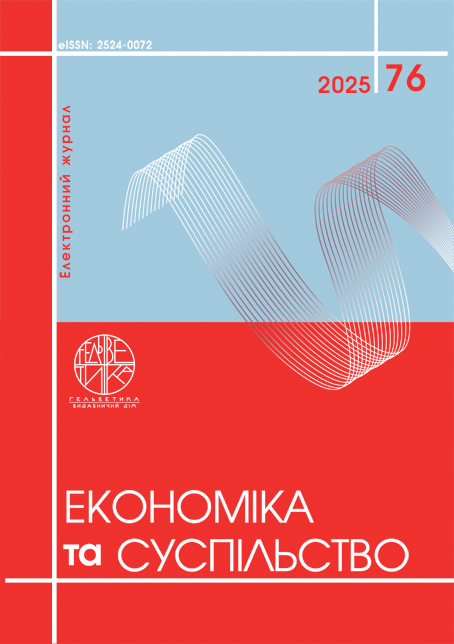ОСОБЛИВОСТІ ФУНКЦІОНУВАННЯ СУЧАСНОГО РИНКУ ПРАЦІ В УМОВАХ РОЗВИТКУ ЕКОНОМІК НОВИХ ЩАБЛІВ
Анотація
У статті досліджуються особливості функціонування сучасного ринку праці в умовах трансформації економік нових щаблів, зокрема під впливом цифровізації, автоматизації, штучного інтелекту, впровадження інноваційних технологій та зеленої трансформації. Розглянуто ключові виклики, серед яких – структурні зрушення у сфері зайнятості, поширення технологічного безробіття, зростання попиту на цифрові, гнучкі та міждисциплінарні навички, ризики поляризації ринку праці та необхідність забезпечення професійної мобільності. Проаналізовано сучасні інструменти політики зайнятості, включаючи професійну перепідготовку, стимулювання підприємництва, розвиток соціального діалогу, модернізацію системи соціального захисту, інституціональну підтримку інноваційної зайнятості та сприяння формуванню екосистеми безперервного навчання. Окреслено перспективи подальших досліджень у контексті розвитку людського капіталу, цифрової економіки, соціальної інклюзії, гідної праці, а також адаптації стратегій сталого соціально-економічного розвитку на національному та регіональному рівнях.
Посилання
International Labour Organization. World employment and social outlook: Trends 2025. Geneva: ILO, 2024. 120 p. URL: https://www.ilo.org/sites/default/files/2025-01/WESO25_Trends_Report_EN.pdf (дата звернення: 01.07.2025).
OECD Publishing. OECD employment outlook 2023. Paris: OECD Publishing, 2023. 180 p. URL: https://www.oecd.org/en/publications/oecd-employment-outlook-2023_08785bba-en.html (дата звернення: 01.07.2025).
Hartley J., Jolevski F., Melo V., Moore B. The Labor Market Effects of Generative Artificial Intelligence. SSRN Working Paper, December 2024. 40 p. URL: https://papers.ssrn.com/sol3/papers.cfm?abstract_id=5136877 (дата звернення: 01.07.2025).
OECD. Employment Outlook 2024: From fear to action: Making labour and social policy central to the net-zero transition. Paris: OECD Publishing, 2024. URL: https://www.oecd.org/en/publications/oecd-employment-outlook-2024_ac8b3538-en.html (дата звернення: 01.07.2025)
World Economic Forum. Future of jobs report 2023. Geneva: WEF, 2023. 110 p. URL: https://www.weforum.org/reports/the-future-of-jobs-report-2023 (дата звернення: 01.07.2025).
International Labour Organization. Gender and automation risks. Geneva: ILO, 2023. 75 p. URL: https://www.ilo.org/global/publications/WCMS_895615/lang--en/index.htm (дата звернення: 01.07.2025).
Судаков М., Лісогор Л. Ринок праці України 2022–2023: стан, тенденції та перспективи. Київ: Європейський банк реконструкції та розвитку, 2023. 45 с. URL: https://solidarityfund.org.ua/wp-content/uploads/2023/04/ebrd_ukraine-lm-1.pdf (дата звернення: 01.07.2025).
European Commission. Upskilling pathways: New opportunities for adults. Brussels: EC, 2022. 85 p. URL: https://ec.europa.eu/social/main.jsp?catId=1224 (дата звернення: 01.07.2025).
World Bank. Small and medium enterprises and the digital economy. Washington: World Bank, 2023. 95 p. URL: https://documents.worldbank.org/en/publication/documents-reports/documentdetail/479171680067145915 (дата звернення: 01.07.2025).
Startup Genome. Global startup ecosystem report 2023. San Francisco: Startup Genome, 2023. 60 p. URL: https://startupgenome.com/report/gser2023 (дата звернення: 01.07.2025).
International Labour Organization. Social dialogue for a just transition. Geneva: ILO, 2021. 90 p. URL: https://www.ilo.org/global/topics/green-jobs/publications/WCMS_824102/lang--en/index.htm (дата звернення: 01.07.2025).
OECD Publishing. The future of social protection. Paris: OECD Publishing, 2022. 115 p. URL: https://www.oecd.org/publications/the-future-of-social-protection-4f42b6c6-en.htm (дата звернення: 01.07.2025).
World Economic Forum. The future of work skills 2030. Geneva: WEF, 2020. 70 p. URL: https://www.weforum.org/reports/the-future-of-jobs-report-2020/ (дата звернення: 01.07.2025).
International Labour Organization. World employment and social outlook: Trends 2025. Geneva: ILO, 2024. 120 p. Available at: https://www.ilo.org/sites/default/files/2025-01/WESO25_Trends_Report_EN.pdf (accessed July 10, 2025).
OECD Publishing. OECD employment outlook 2023. Paris: OECD Publishing, 2023. 180 p. Available at: https://www.oecd.org/en/publications/oecd-employment-outlook-2023_08785bba-en.html (accessed July 10, 2025).
Hartley J., Jolevski F., Melo V., Moore B. The Labor Market Effects of Generative Artificial Intelligence. SSRN Working Paper, December 2024. 40 p. Available at: https://papers.ssrn.com/sol3/papers.cfm?abstract_id=5136877 (accessed July 10, 2025).
OECD. Employment Outlook 2024: From fear to action: Making labour and social policy central to the net-zero transition. Paris: OECD Publishing, 2024. Available at: https://www.oecd.org/en/publications/oecd-employment-outlook-2024_ac8b3538-en.html (accessed July 10, 2025).
World Economic Forum. Future of jobs report 2023. Geneva: WEF, 2023. 110 p. Available at: https://www.weforum.org/reports/the-future-of-jobs-report-2023 (accessed July 10, 2025).
International Labour Organization. Gender and automation risks. Geneva: ILO, 2023. 75 p. Available at: https://www.ilo.org/global/publications/WCMS_895615/lang--en/index.htm (accessed July 10, 2025).
Sudakov M., Lisohor L. Rynok pratsi Ukrainy 2022–2023: stan, tendentsii ta perspektyvy [Labor Market of Ukraine 2022–2023: State, Trends and Prospects]. Kyiv: Yevropeiskyi bank rekonstruktsii ta rozvytku [European Bank for Reconstruction and Development], 2023. 45 p. Available at: https://solidarityfund.org.ua/wp-content/uploads/2023/04/ebrd_ukraine-lm-1.pdf (accessed July 10, 2025).
European Commission. Upskilling pathways: New opportunities for adults. Brussels: EC, 2022. 85 p. Available at: https://ec.europa.eu/social/main.jsp?catId=1224 (accessed July 10, 2025).
World Bank. Small and medium enterprises and the digital economy. Washington: World Bank, 2023. 95 p. Available at: https://documents.worldbank.org/en/publication/documents-reports/documentdetail/479171680067145915 (accessed July 10, 2025).
Startup Genome. Global startup ecosystem report 2023. San Francisco: Startup Genome, 2023. 60 p. Available at: https://startupgenome.com/report/gser2023 (accessed July 10, 2025).
International Labour Organization. Social dialogue for a just transition. Geneva: ILO, 2021. 90 p. Available at: https://www.ilo.org/global/topics/green-jobs/publications/WCMS_824102/lang--en/index.htm (accessed July 10, 2025).
OECD Publishing. The future of social protection. Paris: OECD Publishing, 2022. 115 p. Available at: https://www.oecd.org/publications/the-future-of-social-protection-4f42b6c6-en.htm (accessed July 10, 2025).
World Economic Forum. The future of work skills 2030. Geneva: WEF, 2020. 70 p. Available at: https://www.weforum.org/reports/the-future-of-jobs-report-2020/ (accessed July 10, 2025).
Авторське право (c) 2025 Євген Дмитрієв

Ця робота ліцензується відповідно до Creative Commons Attribution 4.0 International License.


